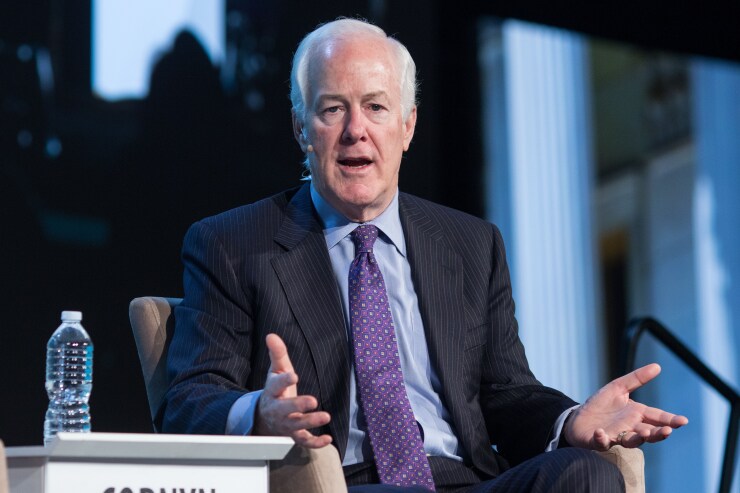(Bloomberg) Senate Majority Whip John Cornyn said Thursday it’s uncertain whether Congress will offset the tax cuts that Republicans hope to deliver with new revenue, creating the chance that their tax-overhaul plan would be limited to 10 years.
“There’s been a lot of discussion about offsets and revenue-neutrality. I think all that’s sort of up in the air at this point,” the Texas senator told reporters. His remarks came two days after Senator Orrin Hatch, the chairman of the tax-writing Finance Committee, acknowledged that a tax bill “may turn out to be” a temporary, 10-year tax cut.
Republicans are re-examining the path forward on taxes in the wake of the House’s failure to secure the votes to pass an Obamacare replacement bill. “Given the developments of the last few days I think the picture’s a little more muddled,” Cornyn said of the next steps on health care and taxes.

Under a Senate budget procedure known as the Byrd Rule, permanent changes to the tax code can only bypass the chamber’s standard 60-vote threshold if they’re projected not to add to the federal deficit after 10 years. But Republicans, who control only 52 seats in the Senate, disagree on how to raise revenue in order to balance the corporate and individual tax-rate cuts they want.
But if lawmakers accept temporary tax cuts, they can add to the deficit within that 10-year window, reducing the need for politically painful compromises.
‘Art of the Doable’
“I’m for the art of the doable,” Hatch told reporters Tuesday. “I’m not sure we have to make it revenue-neutral.” Still, he made clear that his preference is to do a permanent tax overhaul.
That’s also the goal for Speaker Paul Ryan and House Republican leaders, who want to offset their tax reductions with revenue-raisers, most notably a 20 percent destination-based cash flow tax. The measure would be “border-adjusted,” meaning it would tax imports while exempting exports—a feature that has stirred opposition from retailers, oil refiners and other industries that rely heavily on imported materials.
Several senators have been cold to the proposal. Senator David Perdue, a Georgia Republican, said he’d rather see a temporary tax cut than support a border-adjusted tax. “Absolutely. I would prefer that over a border adjustment tax,” he said.
House Ways and Means Chairman Kevin Brady, a Ryan ally, reaffirmed his commitment to revenue-neutral tax reform on Monday, telling reporters that permanent tax changes were “critical” for economic growth.
But some House Republicans who also want a permanent overhaul say they’re concerned that divisions within the GOP make a revenue-neutral tax package difficult.
“It will be difficult for this to be revenue neutral,” Representative Chris Collins of New York said on Monday. “That’s my biggest concern. I want to make it permanent. But if my choice became 10-year, temporary or nothing, I’ll take 10-year, temporary.”
Temporary tax cuts would be “better than doing nothing,” he said.





